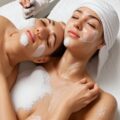Embracing Healthier Skin Care Habits for Radiant Skin
Our skin is a remarkable organ, constantly working to protect us and reflect our overall health. Yet, in our quest for perfect skin, we sometimes fall into habits that may do more harm than good. This article explores some common skincare missteps and offers gentle guidance on how to cultivate a more nurturing relationship with your skin. Remember, the goal isn’t perfection, but rather a compassionate approach to caring for the skin you’re in.
Overcoming the Urge to Overwash
One of the most common skincare habits that many of us need to reconsider is overwashing our faces. While cleanliness is important, excessive washing can strip the skin of its natural oils, leading to dryness, irritation, and even breakouts. Instead of harsh scrubbing multiple times a day, consider a gentler approach:
- Wash your face no more than twice a day, typically in the morning and before bed
- Use lukewarm water instead of hot, which can be too harsh on delicate facial skin
- Choose a mild, pH-balanced cleanser that doesn’t leave your skin feeling tight or dry
- Pat your skin dry gently with a soft towel instead of rubbing
Remember, your skin has its own natural cleansing mechanisms. By being gentle and not overwashing, you’re allowing your skin to maintain its delicate balance.
Mindful Moisturizing: Finding the Right Balance
Moisturizing is a crucial step in any skincare routine, but it’s easy to fall into the trap of either under-moisturizing or using products that aren’t right for your skin type. Here are some tips for mindful moisturizing:
- Apply moisturizer to slightly damp skin to lock in hydration
- Choose a moisturizer that suits your skin type – whether it’s oily, dry, combination, or sensitive
- Don’t forget often-neglected areas like your neck and décolletage
- Consider using a separate, richer moisturizer at night when your skin is in repair mode
Remember, well-moisturized skin is better equipped to protect itself and maintain a healthy glow. It’s not about layering on heavy products, but about finding the right balance for your unique skin.
Sun Protection: A Year-Round Necessity
One of the most impactful changes you can make in your skincare routine is to prioritize sun protection every day, regardless of the weather or season. The sun’s UV rays can cause premature aging, hyperpigmentation, and increase the risk of skin cancer. Here’s how to make sun protection a daily habit:
- Use a broad-spectrum sunscreen with at least SPF 30, even on cloudy days
- Apply sunscreen as the last step in your morning skincare routine
- Don’t forget often-missed areas like your ears, neck, and the backs of your hands
- Reapply sunscreen every 2 hours, or more frequently if swimming or sweating
- Consider additional sun protection like wide-brimmed hats and sunglasses
By making sun protection a non-negotiable part of your routine, you’re showing love and care for your skin in the long term.
The Importance of Gentle Exfoliation
Exfoliation can be a wonderful way to reveal fresher, brighter skin, but it’s easy to overdo it. Harsh scrubs or too-frequent exfoliation can damage your skin’s protective barrier and lead to irritation. Here’s how to approach exfoliation with kindness:
- Limit exfoliation to 1-2 times per week, depending on your skin’s sensitivity
- Choose gentle exfoliants like soft cloths or chemical exfoliants with AHAs or BHAs
- Avoid physical scrubs with large, jagged particles that can cause micro-tears in the skin
- Always follow exfoliation with moisturizer to soothe and protect your skin
Remember, the goal of exfoliation is to gently remove dead skin cells, not to scrub your skin raw. Listen to your skin and adjust your routine as needed.
Nurturing Your Skin from the Inside Out
While topical skincare is important, true skin health starts from within. Here are some ways to nurture your skin from the inside out:
- Stay hydrated by drinking plenty of water throughout the day
- Eat a balanced diet rich in fruits, vegetables, and omega-3 fatty acids
- Get adequate sleep to allow your skin time to repair and regenerate
- Manage stress through practices like meditation, yoga, or deep breathing exercises
- Limit alcohol and tobacco use, which can dehydrate and damage your skin
Remember, your skin is a reflection of your overall health. By taking care of your whole self, you’re also taking care of your skin.
Frequently Asked Questions
1. How often should I change my skincare routine?
There’s no set rule for how often you should change your skincare routine. It’s more important to pay attention to your skin’s needs, which can change with seasons, hormones, or lifestyle factors. If your current routine is working well for you, there’s no need to change it. However, if you notice your skin becoming dry, oily, or irritated, it might be time to reassess and adjust your routine.
2. Is it necessary to use toner in my skincare routine?
Toner isn’t a necessity for everyone. Its primary purpose is to balance the skin’s pH after cleansing and provide an extra layer of hydration. If you have a good cleanser and moisturizer that work well for your skin, you may not need a toner. However, if you enjoy using one and find it beneficial for your skin, there’s no harm in including it in your routine.
3. Can I use the same products for day and night?
While you can use some products both day and night, it’s often beneficial to have separate routines. During the day, focus on protection with products like antioxidant serums and sunscreen. At night, use products that aid in repair and regeneration, such as retinoids or richer moisturizers. Always make sure to remove makeup and sunscreen thoroughly before your nighttime routine.
4. How long does it take to see results from a new skincare product?
The time it takes to see results can vary depending on the product and your skin. For hydrating products, you might notice a difference immediately. For products targeting concerns like acne or fine lines, it can take 4-6 weeks to see noticeable changes. Be patient and consistent with your routine, and remember that dramatic overnight changes are rare in skincare.
5. Is it bad to pop pimples?
While it can be tempting, it’s generally best to avoid popping pimples. This can introduce bacteria, cause inflammation, and potentially lead to scarring. Instead, try using spot treatments with ingredients like salicylic acid or benzoyl peroxide. If you have a particularly troublesome blemish, it’s best to consult a dermatologist who can safely extract it if necessary.
Remember, skincare is a journey, not a destination. Be patient with your skin, treat it with kindness, and celebrate its uniqueness. Your skin is doing its best to protect and support you every day – the least we can do is return the favor with gentle, mindful care.









